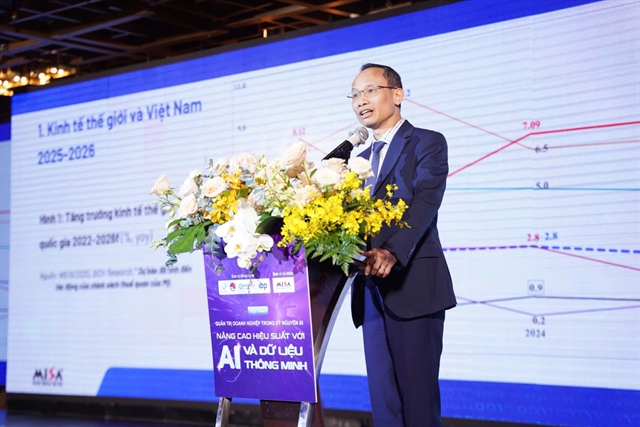Over 1,000 businesses and experts participated in a workshop in HCM City on June 19 to discuss the economic shifts in the AI era and how to apply this technology to enhance business management.

HCM CITY – Over 1,000 businesses and experts participated in a workshop in HCM City on June 19 to discuss the economic shifts in the AI era and how to apply this technology to enhance business management.
The workshop, themed “Corporate governance in the AI era: Improving performance with AI and smart data”, is co-organised by MISA JSC, Vietnam Software and IT Services Association (VINASA), Young Business People Association of HCM City, IBP and others.
Cấn Văn Lực, chief economist of the Bank for Investment and Development of Việt Nam (BIDV), said that the global economy is facing complications from geopolitical conflicts, trade fragmentation, protectionism, and risks from public and private debt.
However, Việt Nam's growth drivers are recovering, including consumption, exports, FDI, public investment and services.
The country's macroeconomic foundation is strengthening, with the exchange rate, bad debt and inflation under control.
Still, the country faces challenges, such as slow public investment disbursement, weak private consumption and investment, pressure from input costs, and the demands of the digital and green transitions.
Lực recommends that for the long term, businesses should focus on two strategic trends, digital transformation and green transition, as well as the application of AI.
“‘Applying AI is about strategies, not just the tech itself,” he said.
He emphasised that for sustainable growth, businesses must build a strong tech foundation, develop their workforce and leverage AI.
Lương Thị Ánh Tuyết, deputy general director and markets leader at PwC Vietnam, said AI is having a global impact, affecting everyone from governments and businesses to individuals.
According to Tuyết, 82 per cent of CEOs in the Asia-Pacific region have adopted GenAI at various levels in the past 12 months and have achieved positive results.
It also creates a demand for new skills, with a PwC report showing that 69 per cent of CEOs believe GenAI will require employees to acquire new capabilities.
In addition, AI is effectively solving many problems in business management.
This includes automating large tasks and reducing the time and cost of data analysis, to quickly supporting managers in making decisions and optimising personnel, thereby improving operational efficiency.
Lê Hồng Quang, general director of MISA JSC, said that the rate of businesses applying AI in management increased from 33 per cent in 2022 to 72 per cent in 2024, according to multiple sources.
Currently, his company is developing many software solutions integrated with AI to help businesses optimise work processing time and improve productivity in many fields.
According to him, AI is an inevitable and necessary trend that must be educated on.
Businesses should use AI and the cloud system to create data for making better decisions.
In addition, businesses should also continuously review and have a plan to apply AI to their processes to help optimise operational and management efficiency. – VNS





